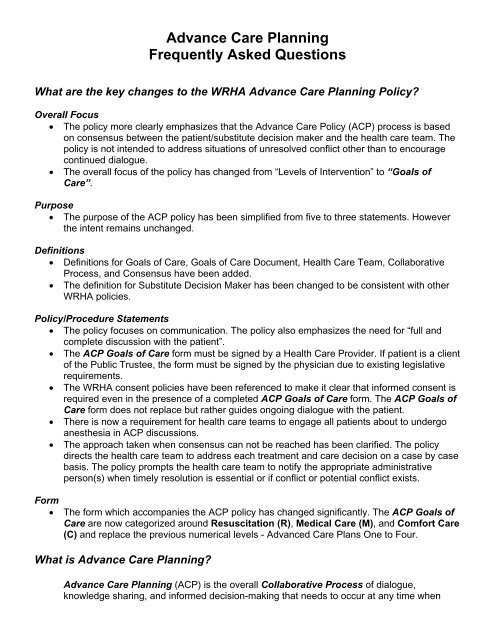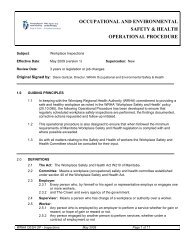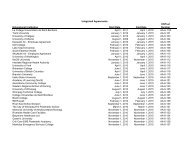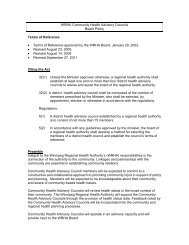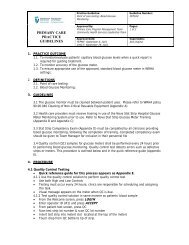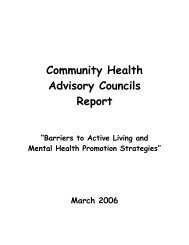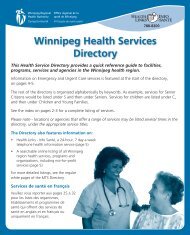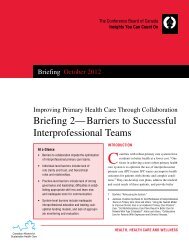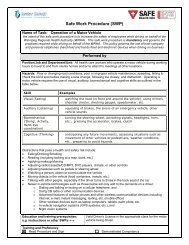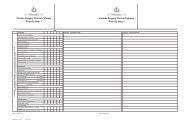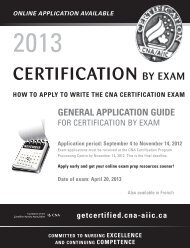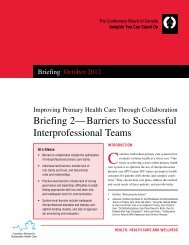Advance Care Planning Frequently Asked Questions
Advance Care Planning Frequently Asked Questions
Advance Care Planning Frequently Asked Questions
Create successful ePaper yourself
Turn your PDF publications into a flip-book with our unique Google optimized e-Paper software.
<strong>Advance</strong> <strong>Care</strong> <strong>Planning</strong><br />
<strong>Frequently</strong> <strong>Asked</strong> <strong>Questions</strong><br />
What are the key changes to the WRHA <strong>Advance</strong> <strong>Care</strong> <strong>Planning</strong> Policy?<br />
Overall Focus<br />
The policy more clearly emphasizes that the <strong>Advance</strong> <strong>Care</strong> Policy (ACP) process is based<br />
on consensus between the patient/substitute decision maker and the health care team. The<br />
policy is not intended to address situations of unresolved conflict other than to encourage<br />
continued dialogue.<br />
The overall focus of the policy has changed from “Levels of Intervention” to “Goals of<br />
<strong>Care</strong>”.<br />
Purpose<br />
The purpose of the ACP policy has been simplified from five to three statements. However<br />
the intent remains unchanged.<br />
Definitions<br />
Definitions for Goals of <strong>Care</strong>, Goals of <strong>Care</strong> Document, Health <strong>Care</strong> Team, Collaborative<br />
Process, and Consensus have been added.<br />
The definition for Substitute Decision Maker has been changed to be consistent with other<br />
WRHA policies.<br />
Policy/Procedure Statements<br />
The policy focuses on communication. The policy also emphasizes the need for “full and<br />
complete discussion with the patient”.<br />
The ACP Goals of <strong>Care</strong> form must be signed by a Health <strong>Care</strong> Provider. If patient is a client<br />
of the Public Trustee, the form must be signed by the physician due to existing legislative<br />
requirements.<br />
The WRHA consent policies have been referenced to make it clear that informed consent is<br />
required even in the presence of a completed ACP Goals of <strong>Care</strong> form. The ACP Goals of<br />
<strong>Care</strong> form does not replace but rather guides ongoing dialogue with the patient.<br />
There is now a requirement for health care teams to engage all patients about to undergo<br />
anesthesia in ACP discussions.<br />
The approach taken when consensus can not be reached has been clarified. The policy<br />
directs the health care team to address each treatment and care decision on a case by case<br />
basis. The policy prompts the health care team to notify the appropriate administrative<br />
person(s) when timely resolution is essential or if conflict or potential conflict exists.<br />
Form<br />
<br />
The form which accompanies the ACP policy has changed significantly. The ACP Goals of<br />
<strong>Care</strong> are now categorized around Resuscitation (R), Medical <strong>Care</strong> (M), and Comfort <strong>Care</strong><br />
(C) and replace the previous numerical levels - <strong>Advance</strong>d <strong>Care</strong> Plans One to Four.<br />
What is <strong>Advance</strong> <strong>Care</strong> <strong>Planning</strong>?<br />
<strong>Advance</strong> <strong>Care</strong> <strong>Planning</strong> (ACP) is the overall Collaborative Process of dialogue,<br />
knowledge sharing, and informed decision-making that needs to occur at any time when
<strong>Advance</strong> <strong>Care</strong> <strong>Planning</strong><br />
<strong>Frequently</strong> <strong>Asked</strong> <strong>Questions</strong><br />
future or potential life threatening illness treatment options and Goals of <strong>Care</strong> are being<br />
considered or revisited.<br />
What is a “Collaborative Process”?<br />
A Collaborative Process refers to the process when the Health <strong>Care</strong> Team engages in<br />
joint planning for the care of the Patient with shared responsibility and decision making that<br />
includes the Patient and family / Substitute Decision Maker.<br />
What are “Goals of <strong>Care</strong>”?<br />
Goals of <strong>Care</strong> are the intended purposes of health care interventions and support as<br />
recognized by both a Patient or Substitute Decision Maker and the Health <strong>Care</strong> Team.<br />
The Patient refers to a Patient, a Resident or a Client.<br />
A Substitute Decision Maker refers to a third party identified to participate in decisionmaking<br />
on behalf of an individual who lacks Capacity. The task of a Substitute Decision<br />
Maker is to faithfully represent the known preferences, or if the preferences are not known,<br />
the interest of the individual lacking Capacity.<br />
The Health <strong>Care</strong> Team refers to the health care professionals that are directly involved with<br />
the Patient’s care.<br />
What does “Capacity” mean?<br />
An individual has Capacity to make health care decisions if he or she is able to understand<br />
the information that is relevant to making a decision and able to appreciate the reasonably<br />
foreseeable consequences of a decision or lack of decision.<br />
What is “Consensus”?<br />
Consensus refers to general agreement and the Collaborative Process of getting to such<br />
agreement.<br />
When is the process of <strong>Advance</strong> <strong>Care</strong> <strong>Planning</strong> initiated?<br />
The process of <strong>Advance</strong> <strong>Care</strong> <strong>Planning</strong> is initiated whenever future treatment options or<br />
Goals of <strong>Care</strong> need to be considered or revised, whether care is occurring in an acute care<br />
facility, in a Personal <strong>Care</strong> Home, or through community based services. Timing is dictated<br />
by the clinical situation.
<strong>Advance</strong> <strong>Care</strong> <strong>Planning</strong><br />
<strong>Frequently</strong> <strong>Asked</strong> <strong>Questions</strong><br />
This process may require one discussion or several discussions over a period of time to<br />
achieve consensus between the Patient or Substitute Decision Maker and the Health <strong>Care</strong><br />
Team.<br />
What is a “Health <strong>Care</strong> Directive”?<br />
A Health <strong>Care</strong> Directive is a self-initiated form used in <strong>Advance</strong> <strong>Care</strong> <strong>Planning</strong> that<br />
complies with the provisions of the Health <strong>Care</strong> Directives Act.<br />
If a Health <strong>Care</strong> Team member is made aware that a Health <strong>Care</strong> Directive exists when<br />
future treatment options or the Goals of <strong>Care</strong> need to be considered or revised, a copy of<br />
the Health <strong>Care</strong> Directive should be obtained and filed behind the designated tab of the<br />
paper health record or scanned into the Contacts/Directive section of an electronic patient<br />
record. This existing Health <strong>Care</strong> Directive guides the <strong>Advance</strong> <strong>Care</strong> <strong>Planning</strong> process<br />
and discussions.<br />
What is an “<strong>Advance</strong> <strong>Care</strong> <strong>Planning</strong> - Goals of <strong>Care</strong>” Form?<br />
The “<strong>Advance</strong> <strong>Care</strong> <strong>Planning</strong> - Goals of <strong>Care</strong>” Form is a form available across the region<br />
used to document a patient’s Goals of <strong>Care</strong> once consensus has been reached between the<br />
Patient or Substitute Decision Maker and the Health <strong>Care</strong> Team through <strong>Advance</strong> <strong>Care</strong><br />
<strong>Planning</strong> discussions.<br />
The <strong>Advance</strong> <strong>Care</strong> <strong>Planning</strong> - Goals of <strong>Care</strong> are categorized as Comfort <strong>Care</strong> (C),<br />
Medical <strong>Care</strong> (M), and Resuscitation (R).<br />
C = Comfort <strong>Care</strong> refers to goals of care and interventions that are directed at maximal<br />
comfort, symptom control and maintenance of quality of life excluding attempted<br />
resuscitation.<br />
M = Medical <strong>Care</strong> refers to goals of care and interventions that are for care and control of<br />
the patient’s condition. The consensus reached between the patient and health care team is<br />
that the patient may benefit from, and is accepting of, any appropriate investigations /<br />
interventions that can be offered excluding attempted resuscitation.<br />
R = Resuscitation refers to goals of care and interventions that are for care and control of<br />
the patient’s condition. The consensus reached between the patient and health care team is<br />
that the patient may benefit from, and is accepting of, any appropriate investigations /<br />
interventions that can be offered including attempted resuscitation.<br />
Who completes the “<strong>Advance</strong> <strong>Care</strong> <strong>Planning</strong> - Goals of <strong>Care</strong>” Form?<br />
Once there is Consensus among those involved in the development of the “<strong>Advance</strong> <strong>Care</strong><br />
<strong>Planning</strong> – Goals of <strong>Care</strong>” Form, a member of the Health <strong>Care</strong> Team completes the form.
<strong>Advance</strong> <strong>Care</strong> <strong>Planning</strong><br />
<strong>Frequently</strong> <strong>Asked</strong> <strong>Questions</strong><br />
If the Patient is a client of the Public Trustee, a physician’s signature is required. The<br />
physician is required to communicate either verbally or in writing directly with the Public<br />
Trustee.<br />
Where is a completed “<strong>Advance</strong> <strong>Care</strong> <strong>Planning</strong> - Goals of <strong>Care</strong>” Form filed?<br />
The completed “<strong>Advance</strong> <strong>Care</strong> <strong>Planning</strong> – Goals of <strong>Care</strong>” Form is filed behind the<br />
designated tab in the Patient’s health record.<br />
The Health <strong>Care</strong> Team ensures that the existence of an “<strong>Advance</strong> <strong>Care</strong> <strong>Planning</strong> – Goals of<br />
<strong>Care</strong>” Form is noted in the Patient’s care plan / kardex.<br />
Does a completed “<strong>Advance</strong> <strong>Care</strong> <strong>Planning</strong> - Goals of <strong>Care</strong>” Form accompany<br />
a Patient during transfer?<br />
If the Patient is transferred, a copy of the “<strong>Advance</strong> <strong>Care</strong> <strong>Planning</strong> – Goals of <strong>Care</strong>” Form<br />
accompanies the Patient<br />
When are Goals of <strong>Care</strong> reviewed?<br />
The Goals of <strong>Care</strong> are reviewed<br />
on each admission<br />
whenever there is an unanticipated significant improvement or deterioration in clinical<br />
status<br />
on or shortly after transfer to another facility<br />
at the request of the Patient of Substitute Decision Maker<br />
at the request of the Health <strong>Care</strong> Team<br />
at minimum, the Goals of <strong>Care</strong> should be reviewed annually<br />
For Patients who are undergoing a procedure that requires general / regional anesthesia<br />
(i.e. blocks / spinal) / procedural sedation and have indicated that they would not accept<br />
aggressive medical therapies such as resuscitation and / or admission to an intensive care<br />
unit, the Health <strong>Care</strong> Team should ensure a discussion takes place with the Patient or<br />
Substitute Decision Maker regarding the response to potential life-threatening problems that<br />
may occur during the perioperative period. The results of these discussions are<br />
documented in the health record and the “<strong>Advance</strong> <strong>Care</strong> <strong>Planning</strong> - Goals of <strong>Care</strong>” Form is<br />
revised as indicated.<br />
When a review of the Goals of <strong>Care</strong> does not result in a revision, the fact that a review<br />
occurred is noted on the “<strong>Advance</strong> <strong>Care</strong> <strong>Planning</strong> – Goals of <strong>Care</strong>” Form.<br />
When a review of the Goals of <strong>Care</strong> necessitates revision, the current “<strong>Advance</strong> <strong>Care</strong><br />
<strong>Planning</strong> – Goals of <strong>Care</strong>” Form is voided by writing “NO LONGER IN EFFECT” diagonally<br />
across the form along with the date and signature of the Health <strong>Care</strong> Team Member. The
<strong>Advance</strong> <strong>Care</strong> <strong>Planning</strong><br />
<strong>Frequently</strong> <strong>Asked</strong> <strong>Questions</strong><br />
“<strong>Advance</strong> <strong>Care</strong> <strong>Planning</strong> – Goals of <strong>Care</strong>” Form that is no longer in effect is filed<br />
immediately behind the most current “<strong>Advance</strong> <strong>Care</strong> <strong>Planning</strong> – Goals of <strong>Care</strong>” Form if any.


